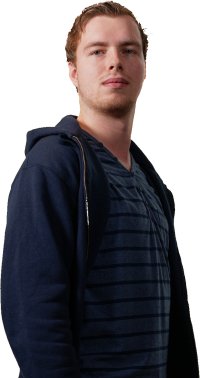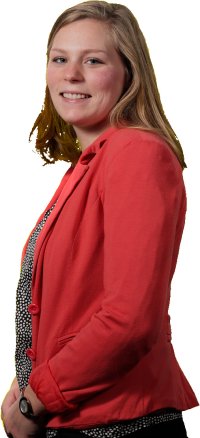
Merijn Kerstens – second year biology
In June he said: ‘We didn’t get the clear assignment we’d expected and were left to our own devices a lot. It is your own responsibility to do something. You may assume all the participants are nerds or outstanding students, but they’re not. It was really chill and I hadn’t expected that at all.’
‘We are now in a really great phase of the programme. We can do anything we like. We organize activities for each other, trying things out in our groups and getting in-depth assignments from teachers. That freedom took some getting used to at first. There were a lot of new ideas and we didn’t know where we stood. But you grow into it. Now we have even more freedom, but that is very nice. For instance, I am helping a professor with a project a student abandoned. It’s rather fun that a second-year BSc student like me is working on a Master’s thesis. I am nice and busy, but not only with the Honours Programme. It doesn’t take up much time – an afternoon or a day a week. I have enough time for other things. I get to party as well.’

Anouk Mulder – second year international development studies
In June she said: ‘I really like the introduction course but it wasn’t terribly challenging. You didn’t have to do much for it, just attend a lecture on Monday evenings and read a book, and that was it. I hope that we will get all sorts of other opportunities, like some experience in the business world and the chance to go to summer schools.’
‘The great thing about the Honours Programme, for me, is that it is sociable. Our group is very nice and everyone is relaxed. There is no question of internal competition. We are simply motivated students who like doing extra-curricular activities. My wish to look for some experience in the business world has come true. We will soon be going to the Microsoft office in Amsterdam. Doors open more easily for honours students. To be honest I haven’t done much towards my assignments yet. It is up to you when you do them and because you really are allowed to do anything, you quickly lose your focus. I can see that in my fellow students too. That openness is a stumbling block, but it does teach you to be assertive. I’m not worried about my tendency to procrastinate. When I have to get something done, I Do. So it will be alright.’

Marijke Zonnenberg – second year food technology
In June she said: ‘Even though Food Technology was a conscious choice, my interests are much broader. I don’t really have expectations for next year. I’ll see how it goes and everything I learn is a nice extra. I don’t have a sense of being privileged because everyone could apply. The selection process was really good so there will be a good reason if you weren’t picked in the end.’
‘It is terribly busy at times. There are evenings when I think: could I please have an evening to myself? But then there you are in an abattoir on Monday morning at nine thirty seeing how 5000 pigs are slaughtered. I would never have seen that otherwise. I spend an average of four hours a week on the Honours Programme. They say it should cost 10 hours a week but I haven’t noticed that yet. Maybe it will be busier later when you round off the project. I am still actively involved in my study association Nicolas Appert. Starting at the end of February I am going to do a year on the board. I think I can do that as well. If you manage your time well, there is no problem. And that evening to myself I get on Saturday evenings at my parents’. There’s just so much I want to do.’
